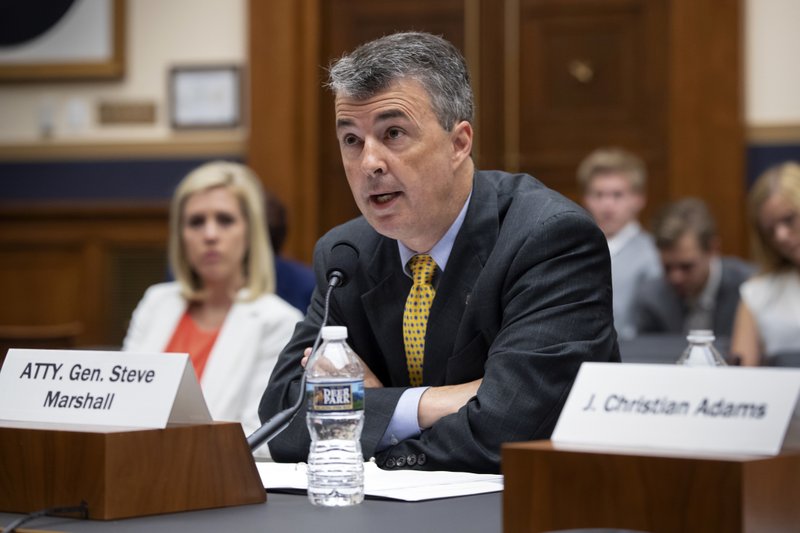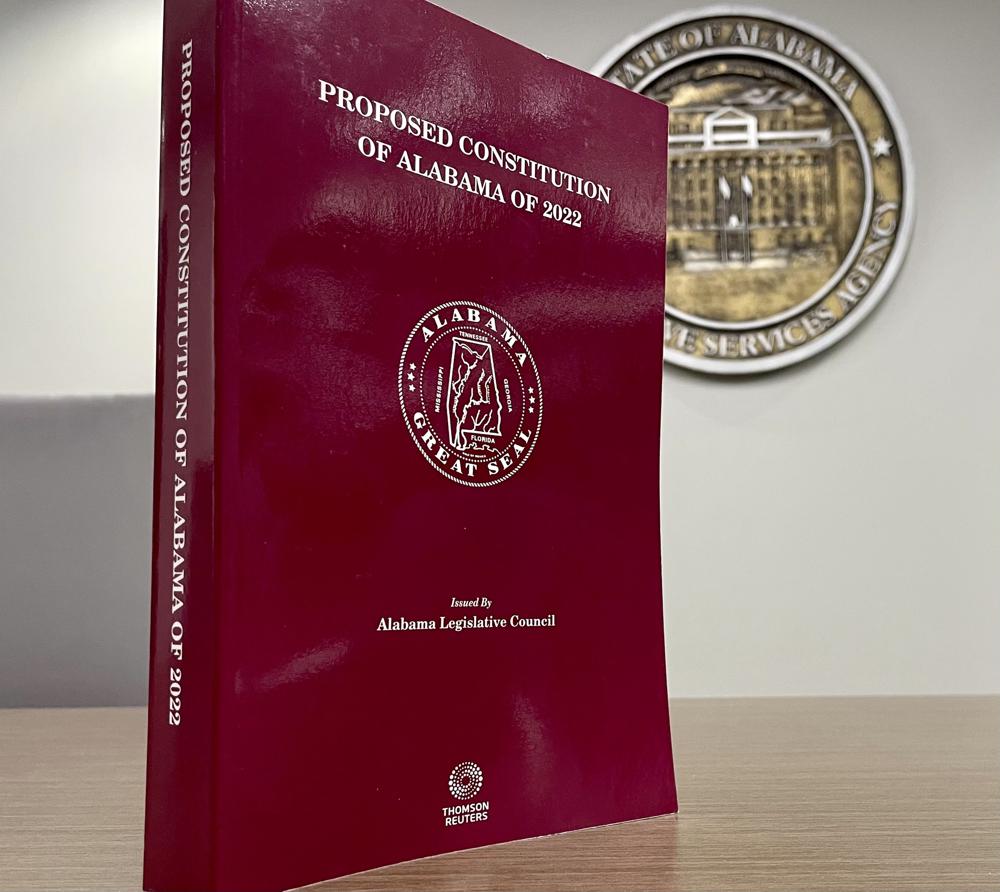Steve Marshall applauds ruling upholding religious exemptions for Covid-19 vaccine mandate for Air Force service members

Alabama Attorney General Steve Marshall hailed a federal appeals court decision on Tuesday in a case supported by the State of Alabama that upheld the right of service members to seek religious exemptions to the U.S. Air Force’s COVID-19 vaccination mandate. “An Airman may sacrifice much serving his country,” said Marshall. “That sacrifice should not include his right to religious liberty. We have protections in place to ensure that an Airman enjoys largely the same rights to religious liberty as his fellow citizens. Those include the Free Exercise Clause and the Religious Freedom Restoration Act. This appeals court ruling underscores that the religious liberty of Air Force personnel cannot be trampled by the government.” President Joe Biden wanted the COVID-19 vaccine more widely adopted by Americans. Congress would not pass vaccine mandates, so the President claimed broad executive powers to order Americans to take the vaccine. Many of these, including an unprecedented OSHA rule, were later blocked by the courts. One area where the mandates were enforced was in the U.S. military, as the President is constitutionally the commander n chief of the American armed forces. Biden’s Secretary of Defense, Lloyd Austin, followed the President’s orders by ordering all DoD employees and service members to get the vaccine. The public was told that service members with a medical reason or a religious objection to the vaccine would not have to get the vaccination. The services, including the Air Force, routinely turned down those requests. “After the Air Force ordered all their personnel receive COVID-19 vaccinations, nearly 10,000 service members sought religious exemptions,” Marshall said. “However, the Air Force has only granted 135 exemptions, with most of those involving personnel already scheduled to retire soon. In February, a lawsuit was filed on behalf of Air Force service members seeking religious-liberty exceptions to the vaccine mandate. In March, a federal district court ruled in their favor, placing a preliminary injunction barring the Air Force from disciplining any member for claiming a religious-liberty exemption to the vaccine mandate.” “After the Air Force appealed the federal district court ruling, I joined with 20 fellow attorneys general in supporting the statutory and constitutional rights of the Airmen who were denied their rights,” Marshall continued. “The victory this week in the U.S. Sixth Circuit Court of Appeals ensures the injunction protecting religious exemptions will continue in effect for Air Force members, including those on active duty, in the reserves, in the Air National Guard, and in the Space Force.” In similar cases, Attorney General Marshall joined 22 attorneys general in filing a brief in April before the U.S. Supreme Court in support of U.S. Armed Forces service members challenging the U.S. Defense Department’s similar failure to grant religious exemptions for DoD personnel from COVID vaccinations. Marshall also filed a brief in August supporting U.S. Navy personnel’s right to seek a religious exemption from the Navy’s COVID vaccination mandate. In defense of Air Force service members, Marshall was joined by attorneys general from Alaska, Arizona, Arkansas, Florida, Kansas, Kentucky, Louisiana, Mississippi, Missouri, Montana, Nebraska, New Hampshire, Oklahoma, South Carolina, Tennessee, Texas, Utah, Virginia, West Virginia, and Wyoming in filing a brief in September. U.S. Sens. Tommy Tuberville and Marsha Blackburn, and others have argued that this is having a tremendous impact on military readiness. “America’s military recruitment is at an all-time low, putting us further behind adversaries like China,” said Sen. Tuberville. “We should not be jeopardizing our national security by putting more restrictions on members of our military who wish to serve. I am proud to support legislation to bolster military readiness and support our men and women in uniform.” The Montgomery-based Foundation for Moral Law hailed the decision as a long-overdue victory for military personnel. Foundation Senior Counsel John Eidsmoe wrote in a statement, “The Sixth Circuit accepted our argument that the USAF failed to give its personnel the individualized determinations that the Constitution requires in Stanley v. Illinois.” “I love the Air Force, but I also love the men and women who wear Air Force blue, and I believe they are entitled to the protection of the Constitution they have sworn to defend,” Eidsmoe said. The Foundation filed an amicus brief in the case. To connect with the author of this story, or to comment, email brandonmreporter@gmail.com.
Foundation for Moral Law cheers Air Force vaccine victory

The Foundation for Moral Law, an Alabama nonprofit dedicated to the defense of religious liberty, applauded the November 29 Doster v. Kendall decision of the Sixth Circuit U.S. Court of Appeals affirming a lower court class-wide injunction prohibiting the Air Force from requiring personnel with religious objections to undergo COVID vaccinations. Eighteen plaintiffs sued Air Force Secretary Frank Kendall and others in February 2022. Prior to the lawsuit, the Air Force had required all personnel to get the Covid-19 vaccine. The plaintiffs in the case argued the mandate violated their religious freedom under the First Amendment and the Religious Freedom Restoration Act of 1993. The District Court agreed. The District Court later expanded the order into a class injunction protecting all USAF personnel with religious objections. The Air Force appealed to the Sixth Circuit, and the Foundation filed an amicus brief supporting those who had religious objections. The Sixth Circuit unanimously affirmed the lower court’s order. The Foundation argued that, although the Air Force had established a policy for considering religious exemptions, the Air Force, in fact, did nothing but rubberstamp denials. The plaintiffs argued that the Air Force granted about 135 of 10,000 requests for vaccine exemptions for religious reasons — and then only to those planning to leave the service. The Liberty Counsel, a non-profit organization that litigates in cases the organization believes involve religious freedom, stated, “The Air Force even agreed that it has not granted any religious exemptions to anyone who does not plan to leave the service within a year. On the other hand, in December 2021, there were a total of 2,047 service members currently with medical exemptions and 2,247 service members currently with administrative exemptions.” The Court agreed and further reasoned that because the Air Force granted thousands of medical and administrative exemptions, their argument that military necessity prevents religious objections was unpersuasive. The Court concluded that First Amendment and the Religious Freedom Restoration Act both protect military personnel. Judge Roy Moore, Founder and President Emeritus of the Foundation and a West Point graduate, hailed the decision as “a long-overdue victory for military personnel over a flawed and useless policy that has ruined the careers of many soldiers and the health of many others.” Foundation Senior Counsel John Eidsmoe, primary author of the amicus brief and a retired Air Force Judge Advocate, noted, “The Sixth Circuit accepted our argument that the USAF failed to give its personnel the individualized determinations that the Constitution requires in Stanley v. Illinois.” Colonel Eidsmoe added, “I love the Air Force, but I also love the men and women who wear Air Force blue, and I believe they are entitled to the protection of the Constitution they have sworn to defend.”
Election 2022: A comprehensive guide to the Alabama Constitutional Amendments

Tomorrow, unlike swing states like Georgia, Pennsylvania, and Arizona, it’s safe to say that the results of all statewide offices will be a foregone conclusion in Alabama. Alabama Daily News polling, released last week confirmed that republican candidates were favored in the state with 62.4 favorability. (Polling that was subsequently ripped off by AL.Com, who reproduced it in its entirety, without permission from behind the ADN Inside Alabama Politics paywall.) According to Secretary of State John Merrill as many as 45-50% of eligible voters are expected to turn out. In addition to statewide offices and legislative races, there will also be a vote on a new recompiled Constitution and ten new constitutional amendments. Here’s a brief look at those constitutional changes on the ballot with summaries from the Associated Press, The Alabama Policy Institute (API), and other sources. If you’re looking to verify your polling place or are looking for sample ballots you can visit AlabamaVotes.gov for you can also find the Fair Election Commission detailed summaries of at this link on the Secretary of State website. Ratification of the Constitution of Alabama of 2022 The Fair Ballot Commission describes this saying, “The Constitution of Alabama of 2022 will only do the following: (1) rearrange the constitution so that similar subjects are located together; (2) remove racist language; (3) delete repeated or repealed portions/language; (4) place all amendments which deal with economic development together; and (5) arrange local amendments by county. The reorganized constitution will make no changes other than those listed above and will not make any changes relating to taxes.” The recompiled document deletes racist language and repealed provisions. It also reorganizes the sprawling document and makes it more user-friendly. The Alabama 1901 Constitution is the longest constitution in the country. This ratification comes Amendment One: The Fair Ballot Commission describes this by saying, “This amendment will change Section 16 to add crimes for which bail can be denied, to include murder, kidnapping in the first degree, rape in the first degree, sodomy in the first degree, sexual torture, domestic violence in the first degree, human trafficking in the first degree, burglary in the first degree, arson in the first degree, robbery in the first degree, terrorism, and aggravated child abuse of a child under the age of six.” Amendment one would create Aniah’s Law, which would limit bail for individuals accused of specified violent crimes. It is named after Aniah Blanchard, who was murdered by a man out on bond for attempted murder. API stated, “While the sentiment for ratifying the law is understandable, it does raise due process concerns for those accused, but not yet convicted, of crimes.” Governor Kay Ivey and Attorney General Steve Marshall urged voters to vote yes for Aniah’s law. Marshall stated, “Aniah’s Law—which you will find on your ballot as Amendment 1—amends the state constitution to allow judges the discretion to deny bond to violent criminals like Aniah’s murderer. So, on Tuesday, be sure to vote “yes” on Amendment 1, which will keep dangerous criminals off the street and the public out of harm’s way. And thank you to Aniah’s family for leading the charge to make Alabama a safer place.” Apryl Marie Fogel, Alabama Today’s publisher and host of Straight Talk with Apryl Marie on News Talk 93.1 FM, said, “Voting yes on Amendment 1 is a no-brainer! This amendment gives judges the ability to use their discretion to deny bail to those who have no business out on our streets. It doesn’t say they must stay in jail, but it says that a judge has the discretion to keep them there. Imagine being a victim or the loved one of a victim of a violent crime, knowing that the person responsible is back out on the street immediately. That’s unacceptable. One of the few responsibilities of government is to ensure public safety. That’s what this does and why we should pass it.” John Eidsmoe and Roy Moore expressed their concerns about the proposed law. “I feel terrible about what happened to Anaiah Blanchard,” Moore said. “But that is not a reason to go and change the constitution.” The Southern Poverty Law Center opposes this amendment telling AL.Com that it could lead to people who are not yet convicted of a crime “languishing in Alabama’s jails for years at a time.” Amendment Two: Amendment two would allow the state, county, and municipal governments to spend federal stimulus funding through grants for broadband infrastructure projects. The state has already allocated money for this purpose. API stated, “The primary concern with this amendment is that Alabama needs it for local governments to be able to spend the money for its authorized purpose in the first place. The state should not control the ability of local governments to spend already allocated money for its intended purpose.” Moore and Eidsmoe said that they are strongly opposed to both Amendments 2. Amendment three would require the Governor to notify the state Attorney General and a victim’s family before postponing or commuting a death sentence. Because then Governor Fob James was hesitant to execute a woman, in 1999, he commuted the death sentence of convicted murderer Judith Ann Neeley before he left office. The family of 13-year-old Lisa Millican, who was brutally raped and murdered by Mrs. Neeley and her husband, were outraged by Gov. James’ actions. This amendment is the Legislature’s response to that decision over twenty years ago. API has no concerns with this amendment. Amendment four to the constitution would require that any law impacting a general election be passed at least six months before the election. API stated, “A potential concern with this amendment is that it could limit the Legislature’s ability to make a necessary change to election law if unexpected circumstances arise less than six months before the next election. It comes down to a question of do you have faith in the government to use this power responsibly, or would you rather them not have the power at all?” Former state representative and current Jefferson County GOP Chairman Paul DeMarco urged voters to support this amendment,
Attorneys Roy Moore and John Eidsmoe express concerns about proposed constitutional changes

The voters of Alabama will go to the polls on Tuesday to vote to elect new leaders for federal, state, judicial, and local office. Perhaps more importantly, the voters are being asked to approve major changes to the Alabama Constitution of 1901. The state legislature is asking voters to approve a recompiled constitution as well as ten proposed constitutional amendments to the state constitution. Alabama Today spoke on Thursday with former Chief Justice Roy Moore and law professor and retired Colonel John Eidsmoe about the proposed changes to the state’s foundational legal document. Moore and Eidsmoe said that they are strongly opposed to both Amendments 2 and 7. Amendment 2 would amend the constitution so that local governments are able to legally “give a thing of value” to private entities or corporations in order to expand broadband services. Amendment 7 makes it easier for local governments to sell bonds to finance economic and industrial development. As part of that, it removes the requirement that the people of the town or county get to vote on any proposed bond issue. “That is a not function of government,” Eidsmoe said of broadband expansion. “The government is picking winners and losers,” Moore said when one business gets an incentive, and another does not. Moore and Eidsmoe were asked if there was an amendment or two that they really liked and wanted to encourage voters to please go and vote to ratify. “Amendment three,” Eidsmoe answered. Amendment three requires a governor to notify the family of a victim before commuting a death sentence. In addition to the ten amendments on the ballot, the Legislature has recompiled the state constitution, shortening it, and grouping like topics together, while removing racist and archaic language from the document. Voters are being asked to ratify the legislature’s version of the recompiled constitution. “We are for removing the racist language (from the Constitution),” Eidsmoe said. “What we are not comfortable with is the process. I have gone through it, and I don’t find anything wrong with it.” “I am simply uncomfortable with the process,” Moore said. “They say that it is the longest constitution in the world, but that is because they (the Legislature) keep adding amendments to it. The problem is the Legislature.” Eidsmoe said that when the United States Constitution is amended, they don’t eliminate the original passages when it is amended, the original words remain, like the Alabama Constitution as it exists today. “It shows the history of the document,” Eidsmoe explained. Eidsmoe said that they had opposed a previous effort to strike the racist language because it also struck a provision stating that there is no right to a state-funded education for fears that liberals could use that equity funding issue to cost the taxpayers billions of dollars. “That seems to still be in there,” Eidsmoe said of the provision to protect the state from having to provide equitable education to every child in the state. Moore said that he felt that the legislature did “more than what was necessary.” He also expressed misgivings about the lack of openness and transparency in the process by which the Legislature change the Constitution, as well as concerns about the ramifications of wording changes. Eidsmoe and Moore also expressed their concerns about the proposed Amendment One – Anaiah’s Law. “I feel terrible about what happened to Anaiah Blanchard,” Moore said. “But that is not a reason to go and change the constitution.” Anaiah’s law would allow prosecutors to ask a judge for a hearing to deny bail to dangerous felons. Under current law, a judge can only deny bail in a capital offense or when the accused is considered to be a flight risk. Eidsmoe said that judges can already make bail prohibitively expensive. Moore said that it was the mistake of the trial judge that Anaiah Blanchard’s killer was let out on bond for kidnapping charges, but that he did not support changing the law because of that case. “Judges can already do that,” Moore insisted. “I know that everyone wants to get tough on crime, but there is a conservative case for justice reform,” Eidsmoe. “The United States has one of the highest incarceration rates in the world. It shouldn’t be that way.” Moore is the Founder and President Emeritus of the Foundation for Moral Law, while Eidsmoe is the Foundation’s lead attorney and resident scholar. “These are not the official positions of the Foundation, but rather our personal opinions,” Eidsmoe said. The polls open on Tuesday at 7:00 am and close at 7:00 pm. Voters can only vote at their assigned polling place and need to bring a valid photo ID to the polls with them in order to participate in Alabama elections. If a voter does not have a valid photo ID, they can get a free voter ID from their local board of registrars or by contacting the Alabama Secretary of State’s Office. To connect with the author of this story, or to comment, email brandonmreporter@gmail.com.
Lawmakers consider plan to ban abortions where fetal heartbeat is detected

A panel of lawmakers heard public comment on a proposal that would make it illegal to perform an abortion without first determining fetal heartbeat, and ban abortions outright when a heartbeat has been detected. House Bill 405, sponsored by Rep. Terri Collins, says that any Alabama doctor who performs an abortion when a heartbeat has been determined would be guilty of a class C felony. Rep. Collins said she introduced the bill because of her experience as a volunteer in a women’s health clinic. “More education – realizing that there is a heartbeat – is critical when moms are making these decisions. Protecting life is important.” Alabama lawmakers attempted to impose similarly strict guidelines on abortions in the 2014 session; the Senate declined to vote on the bill, citing concerns over litigation. “I thought (Rep. Mary Sue McClurkin’s bill) was one of the most common sense bills I’d heard,” said Rep. Collins. “If end of heartbeat determines where life stops, why not use the start of heartbeat to determine when life begins?” Members of several pro-choice organizations spoke in favor of the legislation and its potential to establish a clear, objective test for establishing when abortions would be performed. “The viability test in Roe v. Wade was supported by very little evidence at that time — and less so today,” said attorney John Eidsmoe, board member of Lutherans for Life. “The heartbeat test is objective and clear. Either there is a heartbeat or there isn’t.” Others warned that the bill would effectively ban abortions outright, as many women are unaware they are pregnant until the second month of gestation. A fetal heartbeat can normally be determined as early as six weeks into a pregnancy. Susan Watson executive director of the Alabama ACLU called the bill “one of the most extreme of its kind.” Watson warned that the bill would lead to expensive litigation and a possible Supreme Court case. Similar laws have passed in North Dakota and Arkansas; both were ruled unconstitutional in federal court. House lawmakers declined to vote on the proposal in Wednesday’s hearing.


